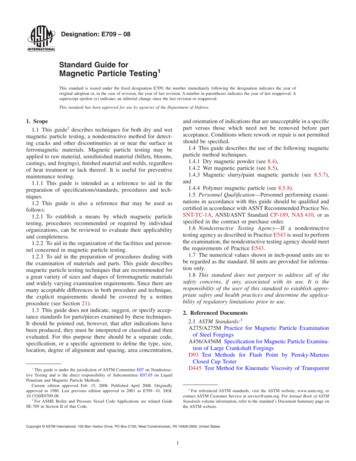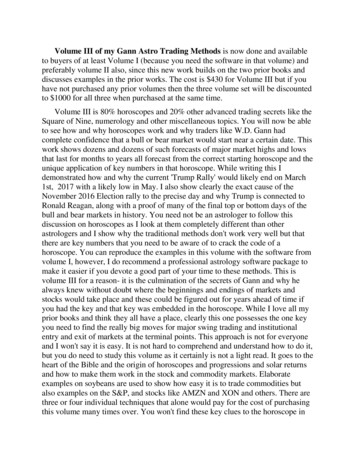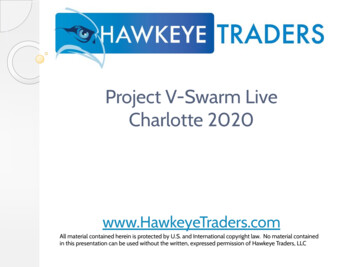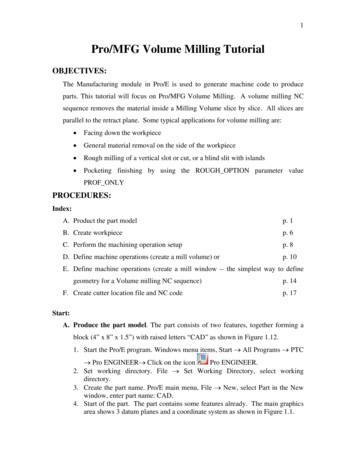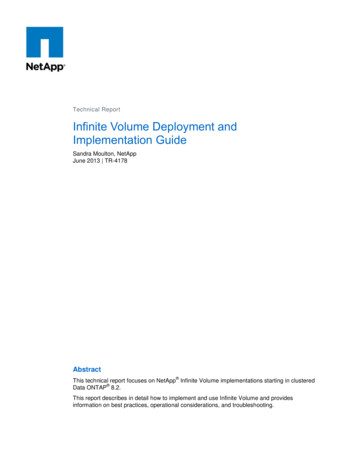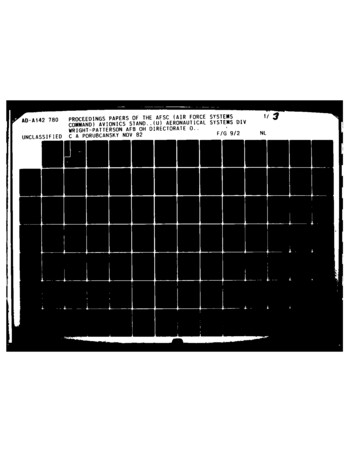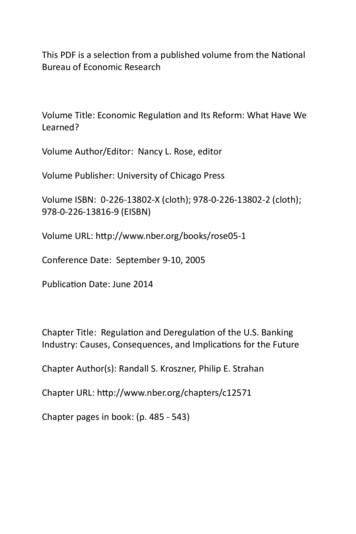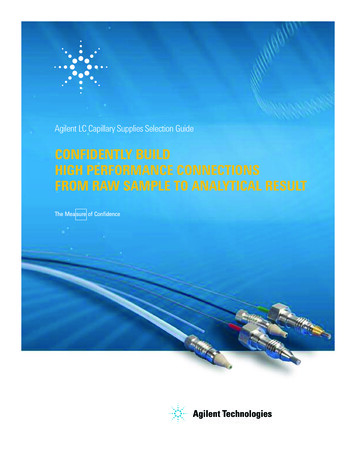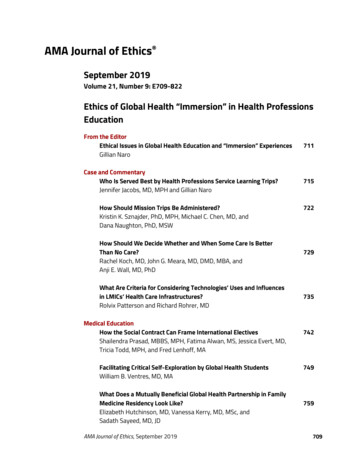
Transcription
AMA Journal of Ethics September 2019Volume 21, Number 9: E709-822Ethics of Global Health “Immersion” in Health ProfessionsEducationFrom the EditorEthical Issues in Global Health Education and “Immersion” ExperiencesGillian Naro711Case and CommentaryWho Is Served Best by Health Professions Service Learning Trips?Jennifer Jacobs, MD, MPH and Gillian Naro715How Should Mission Trips Be Administered?Kristin K. Sznajder, PhD, MPH, Michael C. Chen, MD, andDana Naughton, PhD, MSWHow Should We Decide Whether and When Some Care Is BetterThan No Care?Rachel Koch, MD, John G. Meara, MD, DMD, MBA, andAnji E. Wall, MD, PhDWhat Are Criteria for Considering Technologies’ Uses and Influencesin LMICs’ Health Care Infrastructures?Rolvix Patterson and Richard Rohrer, MDMedical EducationHow the Social Contract Can Frame International ElectivesShailendra Prasad, MBBS, MPH, Fatima Alwan, MS, Jessica Evert, MD,Tricia Todd, MPH, and Fred Lenhoff, MAFacilitating Critical Self-Exploration by Global Health StudentsWilliam B. Ventres, MD, MAWhat Does a Mutually Beneficial Global Health Partnership in FamilyMedicine Residency Look Like?Elizabeth Hutchinson, MD, Vanessa Kerry, MD, MSc, andSadath Sayeed, MD, JDAMA Journal of Ethics, September 2019722729735742749759709
Which LCME Accreditation Expectations Support Quality and Safetyin Global Health Immersion Experiences for Medical Students?Robert Hash, MD, MBA and Barbara Barzansky, PhD, MHPEHow Should Schools Respond to Learners’ Demands for Global HealthTraining?Claudia O. Gambrah-Sampaney, MD, Jesse E. Passman, MD, MPH,Andrielle Yost, MPA, and Glen N. Gaulton, PhDHow Should Academic Medical Centers Administer Students’“Domestic Global Health” Experiences?Sural Shah, MD, MPHPolicy ForumHow Should Public Health Schools Help Meet MillenniumDevelopment Goals in Latin America?Taryn Clark, MD, Julia Terle, MD, and Robert H. Gilman, MDMedicine and SocietyIs Updating the WMA Physician’s Pledge Enough?Ben Bowman and Brian Callender, MD766772778788796Are Patients’ and Communities’ Poverty Exploited to Give HealthProfessions Students Learning Experiences?Harold W. Baillie, PhD and John F. McGeehan, MD801History of MedicineVolunteer Service From American Physicians During the Vietnam WarKelsey Walsh, MA806Art of MedicineAnatomy of a Medical StudentFatimah Hafeez Choudhary813Personal NarrativeVoluntourismHannah R. Sullivan815PodcastHow Can Global Health Outreach Programs Be Both Sustainableand Educational? An Interview with John Straw and Cat Quinn710www.amajournalofethics.org
AMA Journal of Ethics September 2019, Volume 21, Number 9: E711-714FROM THE EDITOREthical Issues in Global Health Education and “Immersion” ExperiencesGillian NaroGlobal health programs provoke a great deal of institutional interest among healthprofessions students. More than 25% of surveyed students report having participated ina global health experience during medical school.1 Students drawn to these experiencesoften incorporate inclusive practices in their future work, which enhances their culturalsensitivity and clinical skills.2,3,4 Initially, learners tend to take part in these experiences tounderstand challenges of global health care and gain exposure to advanced or rarepathologies while developing and ultimately practicing clinical skills in serving many withlimited access to health care.5 These trips can help students and patients, but somestudents return questioning the quality of the care they helped administer and thesustainability of the programs in which they participated. Mismanaged trips can lead tostudent distress, resource depletion, and inadequate care. Academic institutions andinternational nonprofit organizations should consider the value of these trips tocommunities they seek to serve as they continue to promote students’ learning.This theme issue of the AMA Journal of Ethics aims to reflect on the ethics of global healthimmersion experiences. In particular, it addresses ethical questions about standards ofcare and the impact these trips have on local communities, including patients’ access tocare and technology and whether and when some care is better than no care.Several contributors consider who is best served by these trips. Jennifer Jacobs and Irespond to a case of a student who doubts the value of the care her program provides tolocal patients and has conflicting emotions about her participation. We argue that globalhealth experiences should prioritize a community’s needs, especially for building capacityof the local health system. Claudia Gambrah-Sampaney, Jesse E. Passman, AndrielleYost, and Glen N. Gaulton examine how global health initiatives can be restructured tomeet students’ and participating institutions’ needs. Hannah R. Sullivan also shares herpersonal experience fostering cultural and academic exchange as an administrativematernal health program volunteer in Kenya.When we zoom out from students’, clinicians’, and patients’ experiences to considerroles and goals of institutions that design these trips, standards of global aid distributionshould be considered. Taryn Clark, Julia Terle, and Robert H. Gilman discuss how a JohnsHopkins University-directed program implements low-cost, high-impact training in Peruand Bolivia to help these countries meet Millennium Sustainable Development Goals.Ben Bowman and Brian Callender examine the World Medical Association’s updatedAMA Journal of Ethics, September 2019711
Physician’s Pledge, paying special attention to health professions students’ obligationsto proactively support domestic and international human rights and civil liberties.International partnerships among host institutions and US-based academic institutionscan inject health service delivery and research resources into local communities.However, gaps between expectations and reality can emerge when some host countriesfind that costs of hosting students exceed estimates.6 Kristin K. Sznajder, Michael C.Chen, and Dana Naughton consider how to respond to one-sided partnerships. ElizabethHutchinson, Vanessa Kerry, and Sadath Sayeed discuss a bidirectional partnershipbetween the nonprofit Seed Global Health and the WWAMI-University of Malawi/Collegeof Medicine to illustrate prioritization of fundamental ethical principles in the pursuit ofglobal health aims. Kelsey Walsh discusses physicians’ participation in the AmericanMedical Association’s Volunteer Physicians for Vietnam Program (1966-1973).Patients who depend on free clinics for access to primary care, domestically andinternationally, are particularly vulnerable when clinics are primarily staffed and operatedby inexperienced students not yet certified to offer standard of care. Sural Shahexamines the overlap between global and domestic community health in low-resourcesettings and argues that ethics training can help prepare students for ethical questionsarising from suboptimal care, limited resource availability, and systemic inequality.Fatimah Hafeez Choudhary visually represents some students’ doubt about how toexpress respect for patients’ humanity. Harold W. Baillie and John F. McGeehan considerhow to balance stakeholders’ interests in providing care to patients who are poor; theyargue that to provide just care, students should be trained to deliver care in teams. AndRolvix Patterson and Richard Rohrer provide a framework for evaluating technologiesand devices in underresourced settings in responding to a case in which a global healthprogram’s use of mammography might undermine local capacity to provide follow-upcare.As long as people across the globe need health care and either can’t afford it or can’taccess it, ethics and justice questions raised in this issue will persist. Even the best, mostwell-planned and well-intentioned programs can fail in the face of policy, corruption, orcrumbling infrastructure. Many assume that some care is better than no care, but thisidea deserves ethical investigation. Rachel Koch, John G. Meara, and Anji E. Wall respondto a case of a boy in a low-income region who receives free cleft palate surgicalinterventions offered by a team of international surgeons on a global health trip. Theauthors argue that surgical mission teams should use norms for medical mission work asbenchmarks to determine whether a particular intervention meets ethical standards.As health professions trainees prepare for global health trips, good program oversight iscritical. Shailendra Prasad, Fatima Alwan, Jess Evert, Tricia Todd, and Fred Lenhoff arguethat, to preserve the social contract health professions have with society (at home or712www.amajournalofethics.org
abroad), schools, sponsoring organizations, and governing boards should ensure thatglobal health experiences satisfy social expectations about caregivers’ competence andaccountability. Robert Hash and Barbara Barzansky examine the Liaison Committee onMedical Education’s accreditation standards regarding risk assessment, supervision, andeducation in global health settings. Finally, William B. Ventres proposes 6 themes—identity, ideology, ignorance, imagination, intention, and investment—to guide students’cultivation of self-awareness.International health care will continue to be important in health professions education.Scholars and experts contributing to this issue model ways to grapple with ethicalquestions raised by these programs.References1. Association of American Medical Colleges. Medical school graduationquestionnaire: 2018 all schools summary 018gqallschoolssummaryreport.pdf. Published July 2018. Accessed June 19, 2019.2. Drain PK, Primack A, Hunt DD, Fawzi WW, Holmes KK, Gardner P. Global health inmedical education: a call for more training and opportunities. Acad Med.2007;82(3):226-230.3. Gupta AR, Wells CK, Horwitz RI, Bia FJ, Barry M. The international health program:the fifteen-year experience with Yale University’s Internal Medicine ResidencyProgram. Am J Trop Med Hyg. 1999;61(6):1019-1023.4. Johnson O, Bailey SL, Willott C, et al; Global Health Learning Outcomes WorkingGroup. Global health learning outcomes for medical students in the UK. Lancet.2012;379(9831):2033-2035.5. Panosian C, Coates TJ. The new medical “missionaries”—grooming the nextgeneration of global health workers. N Engl J Med. 2006;354(17):1771-1773.6. Ijsselmuiden CB, Kass NE, Sewankambo KN, Lavery JV. Evolving values in ethicsand global health research. Glob Public Health. 2010;5(2):154-163.Gillian Naro is a fourth-year medical student at Penn State College of Medicine inHershey, Pennsylvania, where she is also a member of the Global Health ScholarsProgram. She sits on the Board of Trustees for the Pennsylvania Medical Society’sMedical Student Section and is the chair of the American Medical Association MedicalStudent Section Committee on Bioethics and Humanities. Her professional interestsinclude medical ethics and health care policy, and she hopes to pursue a career in internalmedicine.AMA Journal of Ethics, September 2019713
CitationAMA J Ethics. .AcknowledgementsI would like to thank the authors for their time and dedication in providingstimulating contributions on a topic so important to me and close to my heart. Ialso want to thank my mentor, Dr David Craft, for his guidance and support.Finally, I thank my parents Nick and Erin Naro and my friends, particularly MarieLibassi-Behr, for their constant encouragement and love.Conflict of Interest DisclosureThe author(s) had no conflicts of interest to disclose.The viewpoints expressed in this article are those of the author(s) and do notnecessarily reflect the views and policies of the AMA.Copyright 2019 American Medical Association. All rights reserved.ISSN 2376-6980714www.amajournalofethics.org
AMA Journal of Ethics September 2019, Volume 21, Number 9: E715-721CASE AND COMMENTARYWho Is Served Best by Health Professions Service Learning Trips?Jennifer Jacobs, MD, MPH and Gillian NaroAbstractService learning trips can be a powerful means of fostering culturalcompetency as well as an opportunity for students to expand theirclinical skill set. However, if not planned and executed thoughtfully, theymight not provide lasting benefit to the communities they seek to serve.Through analysis of a case in which participants question the value oftheir short-term international service learning trip, we argue that suchtrips should be designed with the community’s needs in mind, preferablyas identified by the community. Ideally, both the service group and thecommunity should seek opportunities for teaching and exchange in orderto expand the community’s ability to provide care to the local populationlong after the service learning group has left.CaseRM decided to sign up for a spring break service learning trip to a Central Americancountry with a team of 40 dental, medical, nursing, occupational therapy, and pharmacystudents and 2 faculty members from each of those disciplines. Inside a local school,they set up a 3-day free clinic. For most members of the community, this clinic is theonly one available to them throughout the year where they can receive allopathic care, sothe team encountered many acute illnesses and advanced pathologies rarely seen in theUnited States.The trip was a success as defined by the trip organizers, and, upon returning, RM reflectson the trip with fellow students, who agree that the opportunity was positive and lifechanging for them. Some students, however, also shared the same nagging feeling ofworry about doing things in an international setting that they would not be allowed to dodomestically. RM notes, for example, “We would not have been able to work asindependently or perform the same examinations on patients here, and it doesn’t quiteseem fair to the patients there. We not only are inexperienced and might have missedimportant things, but we can’t follow up with them, either. One often hears, ‘Well, somecare is better than no care,’ but I actually don’t find that very satisfying. We get so muchout of these experiences and they get student care—a standard of care below whatwe’re taught to deliver here, with no follow-up and no health care infrastructuredevelopment. In fact, we benefit from their lack of health care infrastructure; it allowsAMA Journal of Ethics, September 2019715
our school and us a reason to do a service learning trip once a year. It just doesn’t feellike a just exchange, and I worry about my complicity in perpetuating it.”CommentaryShortly after graduating from college, the first author participated in an 8-weekvolunteer trip abroad with a small nongovernmental organization to gain some realworld experience abroad while also figuring out a future career path. The work involved avariety of activities including, but not limited to, assisting in school classrooms,shadowing and participating in the care of patients in a small community clinic,restocking pharmacy shelves, and helping to examine patients with acute issues at acommunity outreach clinic. The experience was eye opening, allowing a glimpse of whatit meant to practice in a resource-poor setting and how health care disparities impactaccess to adequate care. It was valuable even for someone who, at the time, had limitedskills and understanding of the local cultural and political context and who had nothingconcrete to offer the local community other than a bag of donated medical suppliescollected prior to the trip. For it was this experience that solidified the first author’sdecision to attend medical school and ultimately fueled her desire to pursue a career inpublic health. The trip revealed large gaps in her knowledge and her lack of awareness ofthe complexities involved in global health work. While the trip was of great personalbenefit, it might have had little, if any, beneficial impact on the community.Multiple studies have identified medical students’ growing interest in training ininternational settings as driving an increase in short-term global health trips and socalled medical missions,1,2 which have numerous benefits. These trips have potential tobroaden the education of medical trainees by increasing their cultural competence andproviding them with valuable insight into health inequities, the social determinants ofhealth, and population-based health.1 Additionally, medical students might see such tripsas an opportunity to expand their clinical skill set and diagnostic acumen and increasetheir exposure to less common medical conditions and disease states.2 Furthermore,evidence suggests that students who participate in these trips are more likely to pursueprimary-care based specialties, express a desire to work with underserved populations,and address health inequities.2,3Although the growing interest in global health has been accompanied by an everexpanding list of global health resources, guidelines, and literature to help guide studentsand schools in designing global health curricula, students are still unprepared. Oftenthese trips occur between medical students’ first and second years of training (the onlyavailable summer break in most curricula). At this time, students are only beginning theirmedical training and have not yet honed their diagnostic skills or had sufficient exposureto common (or uncommon) disease states. Medical students are enthusiastic about theiropportunity to serve vulnerable populations and work in underserved parts of the world;716www.amajournalofethics.org
however, they must be honest about their limitations—be they clinical, cultural, orcommunication related.3,4,5This essay will explore ethical issues raised by service learning trips, including potentialharms to both student volunteers and the communities they serve. We will also discusshow these ethical issues can be addressed by creating formal global health curricula,oversight by medical school accreditation bodies, and reframing service learning trips tofocus less on direct clinical care and more on population health, education, andcommunity outreach.Ethical Issues Raised by Service Learning TripsA number of articles highlight beneficence, nonmaleficence, and justice as guidingprinciples for designing global health trips in a thoughtful and ethical manner.1,5,6 Even inresource-poor settings, the same ethical principles that apply to providing health care inthe United States should be applied. If programs are not implemented in a thoughtfulmanner, they run the risk of exploiting local populations and creating moral distress formedical trainees faced with ethical dilemmas who might not have adequate training fordealing with such situations.1,4,5Exploitation of the community. There is a potential power imbalance between volunteersfrom socioeconomically developed countries and the lower-income communities theyserve that could very easily lead to an exploitative relationship.4,6 This power differentialallows inexperienced health care learners more freedom for clinical decision makingdespite their level of training2 and can foster a false sense of competence on the part ofthe learner. Additionally, global health volunteers have the potential to impact the localhealth care system in which they operate. Reliance on volunteers can undermine thecommunity’s faith in local health care professionals due to a misconception that foreignvolunteers provide superior care or resources that the community might not otherwisebe able to access. Furthermore, it can result in failure of local government to invest in thehealth system.3,4,5,7 In a health system in which resources are already strained, localgovernments might come to rely on foreign volunteers to provide health care for theircommunities rather than invest in health care resources themselves. While foreignvolunteers are seemingly a solution to the problem of scarce resources, failure to investin sustainable health infrastructure that provides care to a community even in theabsence of volunteers can exacerbate health inequities.Learners’ moral distress. In the case presented, students felt conflicted about the clinicalindependence they asserted, the quality of care they provided, and whether theirpresence was beneficial. Multiple studies have documented moral distress on the part oflearners who are unprepared for the ethical dilemmas they face in the field as a result ofsuboptimal global health education, lack of understanding of the local social and politicalcontext in which they operate, and failure on the part of schools to provide a formalAMA Journal of Ethics, September 2019717
educational structure to discuss such challenges.1,3,5 The student RM in this case notes a“nagging feeling of worry” that the students operated outside their scope. At bestoperating outside one’s scope leads to suboptimal care of patients; at worst it leads tonegative clinical outcomes. The negative feelings of students are worth highlighting, asthey can motivate conversations about ethical problems inherent in short-term globalhealth experiences and how to address and even prevent them.Creating a Global Health CurriculumCreating a more formalized global health curriculum, of which short-term global healthexperiences are only one component, can provide students with a framework to supportquality care for the local community in an ethical manner.7 Ideally, training in the socialdeterminants of health, health disparities, cultural sensitivity, health systems, andpopulation health1,4 would provide medical students with information regarding thesocial and political context of the community they are traveling to and enable them toparticipate in discussions about potential ethical dilemmas they might face. Languagetraining would also be beneficial.1,3,5,6 Furthermore, as part of the formalized globalhealth curriculum, ethical commitments should be structured into global healthexperiences.7 Schools need to ensure that students have adequate supervision so thatthey do not operate beyond their scope and that they have the necessary support whenethical dilemmas arise in the field.3,4,5,7 Moreover, having clearly delineated roles for andexpectations of students, faculty, staff, and members of the local community is crucial toensuring that service learning trips are executed in a thoughtful and ethical manner.3,4,5,6,7In addition to being part of a standard framework, short-term global health trips shouldadhere to standards put forth by medical school accreditation bodies to ensure that theyare conducted in an ethical manner. Although the Association of American MedicalColleges provides a number of resources for medical students pursuing electivesabroad,8 there is currently no universal set of guidelines that we know of governingservice learning trips.9 As education about global health and working with underservedpopulations becomes incorporated into more medical school curricula, it should beevaluated and governed by the same standards that apply to the rest of medical studenteducation.10Reframing Service Learning TripsThese proposed curricular changes, in concert with designing trips with the needs of thehost community in mind, can require medical schools and their students to reframe theway they look at short-term global health experiences. Creating trips that focus more onhealth education, health systems, and population health would eliminate the problems ofmoral distress and reduce the exploitation of communities discussed earlier. Shifting thefocus away from direct patient care would mitigate the potential harm caused—andmoral distress experienced—by students operating beyond their scope or withoutproper supervision in the clinical setting. It would also reduce, though not fully eliminate,718www.amajournalofethics.org
the risk of an exploitative relationship between foreign volunteers and the communitiesin which they practice by allowing for a true 2-way exchange between volunteers andcommunities with the aim of addressing the needs of the local community, as identifiedby the community. Indeed, stepping back from clinical work would not eliminate allethical issues, nor would it solve host communities’ resource and care shortages. It does,however, have the potential to address a number of problems inherent in short-termclinical work abroad by facilitating development of a skill set that students can applythroughout their careers.Defining and Ensuring a Successful ProgramThe case referred to the trip as “a success,” begging the question of who defines thissuccess. While the trip might have been a success in the eyes of some volunteers, the“nagging feeling” on the part of RM rightfully suggests that success is in the eye of thebeholder and that perhaps the trip might not have been as successful from the view ofthe community or other participants. This again harks back to the concept that servicelearning trips are not one-way interactions and success must be defined accordingly.Different players enter global health projects with varying goals and expectations. Whenreflecting on who is best served by medical trips and global health curricula, it isimportant to analyze the larger mission of service trips and define success for allstakeholders. Most importantly, a conversation over resources and community needs, aslead by the host community, will paint a clearer picture of what is a true communalsuccess.A number of steps can be taken to ensure that service trips are successful. Hostcommunities and clinic teams, trip facilitators, medical schools, teachers, learners, andpatients ideally can identify shared goals in advance, thus setting the groundwork for amore successful mission3,4 while serving to balance the power differential betweentravelers and local communities. Prior to the trip, promoting students’ self-reflection ontheir intentions and motivations for volunteering can address misaligned or romanticizedexpectations. Debriefing, ensuring that there is appropriate follow-up after volunteersdepart, and incorporating routine evaluation of programs using predefined outcomemeasures can allow for better assessment of both the student experience and theprogram’s impact on the community.2,4,5,6 The students’ feeling of doubt about the extentof lasting and sustainable change created by their own global health experiences iscommon and should not be ignored. These feelings of conflict indicate room for growthand can be fruitful as a means of addressing larger health system needs.References1. Lahey T. Perspective: a proposed medical school curriculum to help studentsrecognize and resolve ethical issues of global health outreach work. Acad Med.2012;87(2):210-215.AMA Journal of Ethics, September 2019719
2. Jeffrey J, Dumont RA, Kim GY, Kuo T. Effects of international health electives onmedical student learning and career choice: results of a systematic literaturereview. Fam Med. 2011;43(1):21-28.3. Crump JA, Sugarman J. Ethics and best practice guidelines for trainingexperiences in global health. Am J Trop Med Hyg. 2010;83(6):1178-1182.4. Melby MK, Loh LC, Evert J, Prater C, Lin H, Khan OA. Beyond medical “missions” toimpact-driven short-term experiences in global health (STEGHs): ethicalprinciples to optimize community benefit and learner experience. Acad Med.2016;91(5):633-638.5. Asgary R, Junck E. New trends of short-term humanitarian medical volunteerism:professional and ethical considerations. J Med Ethics. 2013;39(10):625-631.6. Decamp M, Lehmann LS, Jaeel P, Horwitch C. Ethical obligations regarding shortterm global health clinical experiences: an American College of Physiciansposition paper. Ann Intern Med. 2018;168(9):651-657.7. Wilson JW, Merry SP, Franz WB. Rules of engagement: the principles ofunderserved global health volunteerism. Am J Med. 2012;125(6):612-617.8. Association of American Medical Colleges. Students in the US pursuing electivesabroad. broad/. Accessed April 20,2019.9. Lasker JN, Aldrink M, Balasubramaniam R, et al. Guidelines for responsible shortterm global health activities: developing common principles. Global Health.2018;14(1):18.10. Liaison Committee on Medical Education, Association of American MedicalColleges. Functions and structure of a medical school: standards for accreditationof medical education programs leading to the MD degree. ds/2020-21 Functions-and-Structure 201905-01.docx. Published March 2019. Accessed June 8, 2019.Jennifer Jacobs, MD, MPH, recently completed her internal medicine residency at PennState Hershey Medical Center in Hershey, Pennsylvania, and is pursuing a career inprimary care. She earned her MPH and MD degrees from Oregon Health & ScienceUniversity in 2016. Prior to medical school, she worked in international family planningand reproductive health.Gillian Naro is a fourth-year medical student at Penn State College of Medicine inHershey, Pennsylvania, where she is also a member of the Global Health ScholarsProgram. She sits on the Board of Trustees for the Pennsylvania Medical Society’sMedical Student Section and is the chair of the American Medical Association MedicalStudent Section Committee on Bioethics and Humanities. Her professional interestsinclude medical ethics and health care policy, and she hopes to pursue a career in internalmedicine.720www.amajournalofethics.org
Editor’s NoteThe case to which this commentary is a response was developed by the editorialstaff.CitationAMA J Ethics. .Conflict of Interest DisclosureThe author(s) had no conflicts of interest to disclose.The people and events in this case are fictional. Resemblance to real events or tonames of people, living or dead, is entirely coincidental. The viewpoints expressed inthis article are those of the author(s) and do not necessarily reflect the views andpolicies of the AMA.Copyright 2
and global health research. Glob Public Health. 2010;5(2):154 -163. Gillian Naro is a fourth-year medical student at Penn State College of Medicine in Hershey, Pennsylvania, where she is also a member of the Global Health Scholars Program. She sits on the Board of Trustees for the Pennsylvania Medical Society's
